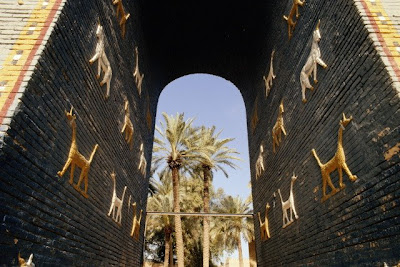Maqam Nawa
Yusuf Omar and al-Chalghi al-Baghdadi
1972, Baghdad, Iraq.
مقام النوى من اجمل ما اداه يوسف عمر مع فرقه الجالغي البغدادي من تسجيل إذاعة بغداد عام ١٩٧٢
(السنطور: عبد الله علي، الجوزه: شعوبي ابراهيم الاعظمي، حسن علي النقيب، الطبله: عبد الرزاق مجيد، الرق: كنعان محمد صالح، الدف الزنجاري: ضياء محمود احمد،)
القصيده للشاعر ابن معصوم المدني و هو علي خان بن ميرزا احمد الشيرازي الحسيني (١٧٠٧-١٧٤٣)م
اما الصبوح فانه فرض * فعلام يكحل جفنك الغمض
هذا الصباح بدت بشائره * ولخيله في ليله ركض
والليل قد شابت ذوائبه * وعذاره بالفجر مبيض
فانهض الى صهباء صافية * قد كاد يشرب بعضها البعض
يسقيها من كفه رشأ * لدن القوام مهفهف بض
والكاس اذ تهوي به يده * نجم بجنح الليل منقض
تدمي اللواحظ خده نظرا * فاللحظ في وجناته عض
سيان خمرته وريقته * كلتاه ماضي عنبيه محض
لا تنكروا لهوي على كبر * فعلىّ من زمن الصبا قرض
بات الندامى لا حراك بهم * الا كما يتحرك النبض
مهلا فليس على الفتى دنس * في الحب ما لم يدنس العرض
- مقدمة موسيقية موزونة بنغمة النوى مع ايقاع السماح ٤/٣٦
- التحرير بنغم النوى من جزئين بلفظة "امان امان" بالاستقرار على درجة الدوگاه ثم لازمة موسيقية و لفظة "امان امانم" بالاستقرار على درجة النوى
- خمسة ابيات من القصيدة بنغمة النوى مع ايقاع اليگرك العراقي ٤/١٢ تتخللها لوازم موسيقية يصاحبها ايقاع السماح ٤/٣٦
- الجلسه بالنزول من درجة العجم الى الدوگاه وانتهاء النصف الاول من المقام
- الميانة الاولى بنغمة البيات و ايقاع الوحده ٤/٤ ثم العوده الى النوى
- اربعة ابيات من القصيدة بنغمة النوى
- الميانة الثانية بنغمة الحسيني
- قطعة الجبوري (نغمها بيات
- قطعة الارواح (نغمها حسيني
- قطعة المسچين (نغمها رست) بلفظة "يابه اشْولَك يا غانم
- التسليم او التسلوم بنغمة النوى بلفظة "يا حبي حبيبي" و الاستقرار على درجة النوى وهو ختام المقام
- بسته بغدادية "يالزارع البزرنگوش" بنغم النوى و ايقاع السنگين سماعي ٤/٦
Maqam Nawa: This basic maqam is based on the nawa mode. *

First part:
- Instrumental improvisation on a 36/4 samah rhythm which alternates with the 12/4 yugrug throughout the first part.
- Tahrir on the words "aman aman" in nawa mode with a rest on D. (0:55)
- Instrumental interlude. Second part of the tahrir on the words "aman amanem" with a rest on G. (1:10)
- Five verses in nawa mode separated by instrumental interludes to the samah rhythm. (1:56)
- Jalsa cadenza beginning in 'ajam and ending in bayat.
Second part:
- First meyana in bayat mode on D, on a 4/4 wahda. (8:16)
Return to nawa
- Four verses (some of which are repeated) sung in nawa mode.
- Second meyana in huseyni mode. (3:35)
- "Jiburi" piece in bayat. (3:50)
- "Arwah" passage in huseyni. (4:11)
- "Mischin" piece in rast mode to the words "yaba shwelak ya ghanim". (4:22)
- Final teslim returning to nawa mode on the words "Ya hubi habibi" (4:33)
- Peste، traditional Baghdadi song, "Yal zari' il bazringosh" in nawa mode and 6/4 sengin sama'i rhythmic accompaniment. (5:06)
The qasida is by Ali Khan al-Hassani al-Husseini (17th century) born in Mecca:
Drinking in the morning is a duty.
Why are your eyelids so blackened by sleep?
Dawn appears and her horses still run into the night.
The night's temples are greying and her tresses have been whitened by the dawn.
Rise up to see this magic potion so pure it almost drank itself.
A graceful gazelle, slender, light and tender will serve you herself.
And when her hands lower the cup, this becomes a shooting star.
In the wings of the night.
Looks turning his cheeks red.
One would say she has been bitten.
The drinkers are so drunk
That only their pulse moves in them.
Do not deny me ecstasy on account of my age.
I am only repaying a debt of my youth.
Patience, love does not sully the man whose honour is secure.
Peste: "Yal zari' il bazringosh" This Baghdadi peste, sung to a 6/4 sengin sama'i rhythm, refers to singer-dancers who, coming to get rich in the cabarets of Baghdad, afterwards return to Syria and Turkey. In another explanation, the song is a story of lost youth when old merchants sit in a Baghdad garden and ask the gardener to plant henna instead of bazringosh so they can dye their gray heads after they have lost both their youth and their merchandise.
Refrain: O sower of bazringosh (a flower)
Our camels are going to the west,
towards Damascus and will never return.
Loaded with gold and houris,
Strike metal against metal and listen to the echo!
O my love, you have wounded me, heal me!
O my heart, your wound is bleeding never to end.
* Commentary by Scheherazade Qassim Hassan
Vocals: Yusuf Omar (d. 1987)
Santur: Abdallah Ali
Djoze: Shaoubi Ibrahim al-A'dhami (d. 1991)
Djoze: Hassan Ali al-Naqib (d. 1986)
Tabla: Abdul Razzaq Majid
Raqq: Kan'an Mohammed Salih
Daff zinjari: Dhia' Mahmoud Ahmed
Choir: Ali al-Dabbou, Abdul Wahid Zaidan, Falih Jawhar, Abdul Qadir








Comments
Post a Comment